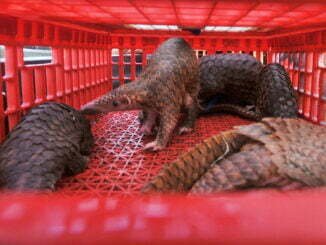
Rubirizi, Uganda | URN | Jovita Kyomugisha, a community wildlife conservationist grew up knowing that elephants only provide revenue from tourists. However, when Kyomugisha went to Magambo sub county in Rubirizi district, some elders told her that elephant dung was a source of revenue for locals.
She kept wondering how residents got the courage to gather elephant dung, but the elders explained to her that the dung was more paying to residents compared to when they act as tour guides.
Kyomugisha says that one of the elders who was working with the United National Development Program-UNDP explained to her that the elephant dung could be processed and turned into paper.
She later received a month-long training from UNDP together with other residents on how to convert the dung into paper. They embarked on making paper, books, wallets and table mats after the training. Kyomugisha says the idea of making paper from the elephant dung came from turning a difficult situation into an opportunity.
“When elephants walked into our gardens all the time, destroying crops and incensing the locals, we decided to get what they left in our gardens and make something productive like paper,” she told this publication.
Together with a group of 100 women and six men, they signed a Memorandum of Understanding (MoU) with Uganda Wildlife Authority (UWA) in 2019 granting them access to Queen Elizabeth National Park to collect elephant dung.
Kyomugisha says the project has changed the lives of Rubirizi residents as they are now able to pay fees for their children in private schools and universities. She says that they have also constructed social amenities such as health facilities, energy stoves and a hotel which has brought windfall profits that they only dreamt of in the past.
Moses Agaba, one of those involved in producing paper from elephant dung says they collect at least 1,300 kilograms of dung that they use to produce least 50 books of 40 pages each in varying sizes. He says they sale the books for between Shillings 20,000 and 100,000.
Happy Ali, one of those involved in the elephant dung project from Mutundwe in Kampala says they are often escorted by rangers to pick the dung from Queen Elizabeth National Park.
Read Also: Queen Elizabeth National Park registers increased cases of poaching in lockdown
Ali says at least 2,000 people are benefiting from the elephant dung product value chain including dung gatherers, sorters, purifiers, paper makers, bookmakers and traders.
Simplicious Gessa, the public relations officer Uganda Wildlife Authority (UWA) says the use of elephant dung for income generating activities has partly reduced elephant poaching and increased love for the animal from the local communities.
According to the UWA statistics, the elephant populations in Uganda rose from 4393 to 5810 elephants between 2011 and 2019.



